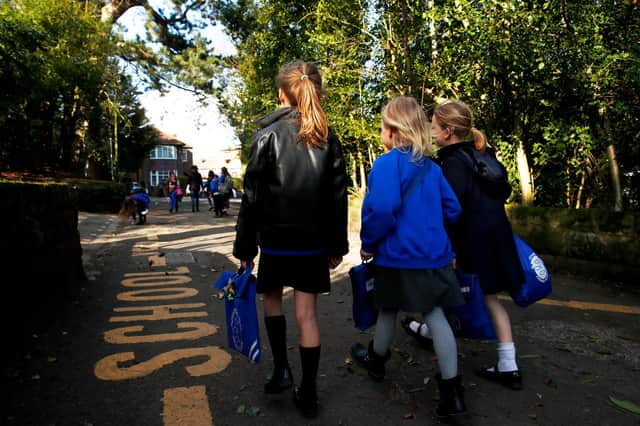This is when schools in England break up for Easter - and when they go back


All primary and secondary schools are closed as part of the third national lockdown.
Pupils have been remote learning since 5 January, but plans for them to return to classrooms are set to be announced next week.
Advertisement
Hide AdAdvertisement
Hide AdBoris Johnson is expected to detail his roadmap out of lockdown on 22 February which will include the date students could return to school.
So, when is the school Easter holiday this year - and will pupils be back in classrooms before then?
Here is everything you need to know.
Why did schools close?
Primary and secondary schools across England were forced to close after Boris Johnson’s third lockdown announcement on the evening of Monday 4 January.
Mr Johnson said the NHS was at risk of being overwhelmed within 21 days if further restrictions were not introduced.
Advertisement
Hide AdAdvertisement
Hide Ad“I completely understand the inconvenience and distress this late change will cause millions of parents and pupils up and down the country,” he said at the time.
The prime minister explained that schools had to shut to prevent the spread of the disease and the new coronavirus strain which had emerged in the UK.
He said: “Because we now have to do everything we possibly can to stop the spread of the disease, primary schools, secondary schools and colleges across England must move to remote provision from tomorrow, except for vulnerable children and the children of key workers.
“Everyone will still be able to access early years settings such as nurseries.”
Advertisement
Hide AdAdvertisement
Hide AdMr Johnson stressed that schools were not closing because they were unsafe for children, but because they act as “vectors for transmission” between households.
When will schools reopen?
It is planned that schools in England will start to reopen on 8 March.
Mr Johnson is reportedly looking at a “big bang” approach of all primary and secondary school students returning to classrooms at the same time, according to the i paper.
And speaking to Sky News, Foreign Secretary Dominic Raab said the government was “committed to” the 8 March date.
Advertisement
Hide AdAdvertisement
Hide AdHe added that ministers were “confident” that schools would be able to reopen then.
However, Mr Raab did not say whether it would be a phased return for pupils or not, saying the data would need to be evaluated “carefully” before plans were finalised.
It is thought that some of the government’s scientific advisers support a staggered return as the impact on the R number is likely to be less.
Schools will receive two weeks’ notice before they need to reopen.
Advertisement
Hide AdAdvertisement
Hide AdThe government has insisted that opening schools again remains the “top priority” when it comes to easing restrictions.
When is the Easter holiday?
The Easter holiday in England usually lasts for two weeks but its start date can vary across the country.
The spring break for most schools in the 2020/21 academic year will run from Thursday 1 April to Friday 16 April.
This means most students are expected to return to classrooms on Monday 19 April.
Advertisement
Hide AdAdvertisement
Hide AdHowever, parents should double check dates with their local council which should have all the term dates published online.
This government postcode checker will help you to find your local authority’s website.
You can also check when the holiday is with your local school as term dates can vary between institutions.
What could the Covid rules be at Easter?
Along with the reopening of schools, Prime Minister Boris Johnson is expected to detail other restrictions that could be eased during his roadmap announcement on 22 February.
Advertisement
Hide AdAdvertisement
Hide AdIf the R number remains low after schools return, the second stage would be to open up non-essential shops, a government official reportedly told the i.
After that, hospitality businesses could open by Good Friday on 2 April, including hotels, restaurants and pubs, the source said.
But ministers have warned that any relaxation of restrictions would be dependent on infection rates and the pace of the vaccine roll-out.
The prime minister had previously said restrictions would not be eased in one fell swoop, saying the process would be “gradual” and not “a great open sesame”.